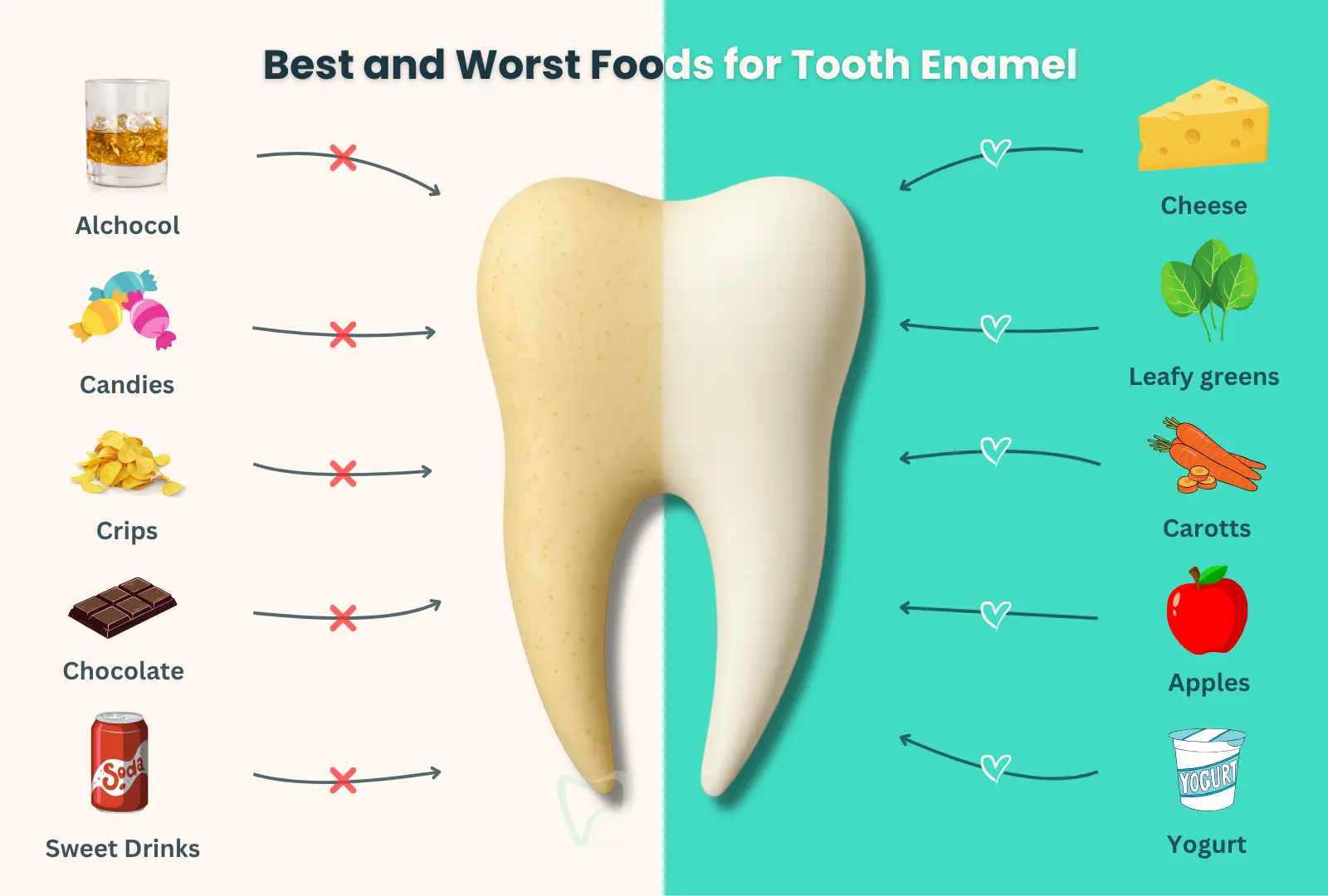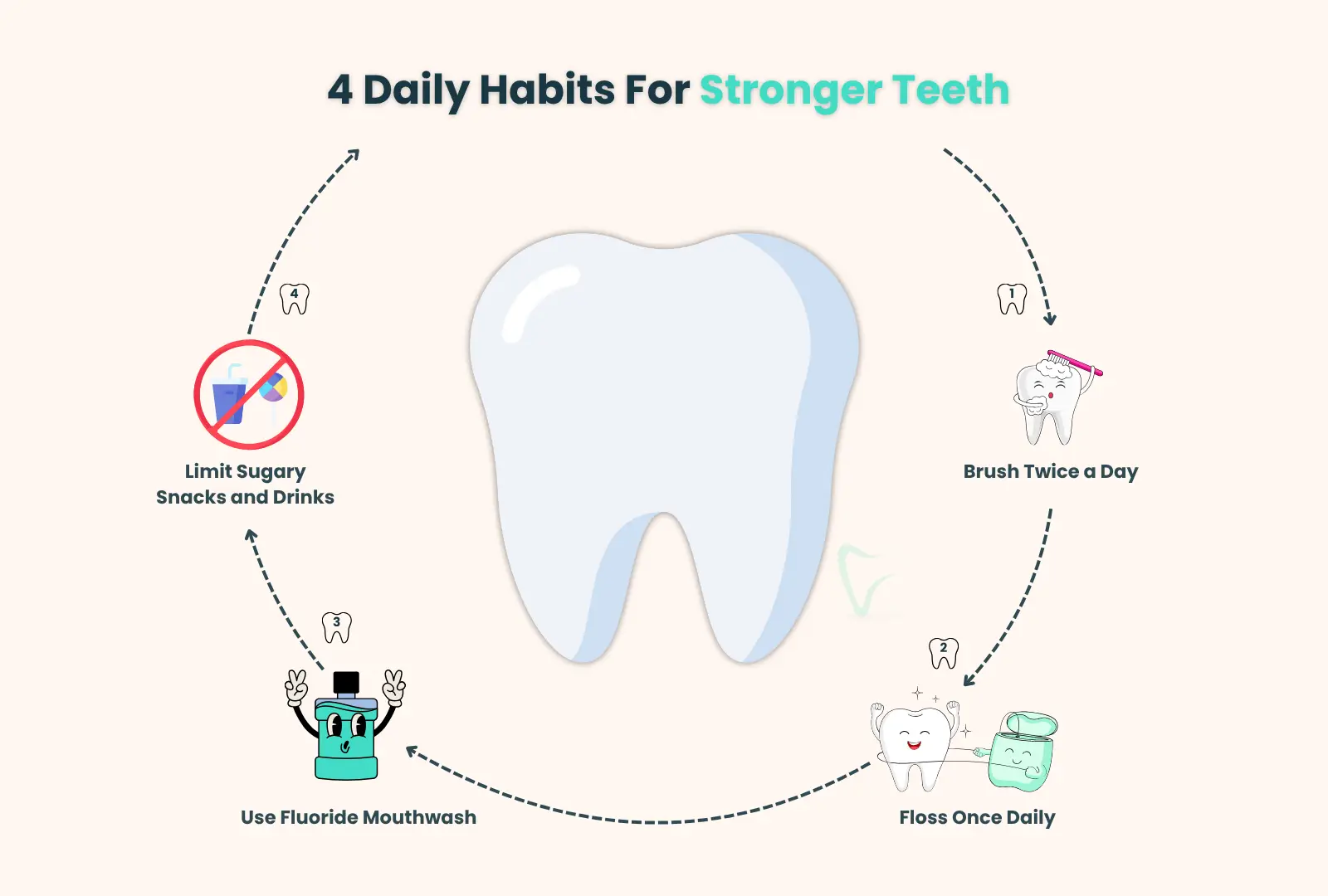| Key Takeaways Enamel is the protective outer layer of your teeth, and once it’s gone, it can’t be replaced, but it can be protected. A healthy diet, including enamel-strengthening foods like calcium-rich cheese, leafy greens, and vitamin-packed fruits, can help maintain strong teeth. Daily habits like brushing with fluoride toothpaste, flossing, and using enamel-strengthening toothpaste are essential for good oral health. Natural remedies such as oil pulling, green tea rinses, and saltwater rinses can help support tooth health. Regular dentist visits are vital for catching issues early and protecting your teeth from further damage. |

Have you ever wondered why some people seem to have flawless teeth while others struggle with sensitivity, cavities, or frequent dental visits? The difference often comes down to how well their teeth are cared for. According to the World Health Organization, strong teeth are not just about aesthetics—they play an important role in everyday functions like chewing and speaking comfortably. Without strong teeth, you could face difficulty eating, speaking, or even smiling confidently. However, several factors can contribute to weakened teeth, making them more vulnerable to damage.
Poor diet, lack of proper oral care, and habits like consuming acidic drinks or sugary snacks are common culprits. Additionally, some people are also naturally more likely to have weaker teeth because of their genetics. Understanding what causes weak teeth is the first step to protecting them, and this guide will show you simple steps on how to strengthen teeth naturally and keep them healthy for the long run.
Diet and Nutrition for Strong Teeth

What you eat plays a big role in the health of your teeth. Certain foods and drinks can help strengthen your teeth, while others can cause damage over time. Eating a balanced diet filled with enamel-strengthening nutrients is one of the simplest and most effective ways to keep your teeth strong. Let’s take a look at which foods and drinks can support healthy teeth and what vitamins for strong teeth can help protect enamel.
Best foods and drinks
Here are some foods to incorporate into your diet for healthier teeth:
- Cheese: Rich in calcium and phosphate, cheese helps neutralize acids in the mouth, which can protect enamel. Studies have shown that dairy products like cheese help how to strengthen your teeth and gums naturally by helping balance the pH in the mouth. A study found that cheese can raise the pH of plaque and reduce the risk of enamel erosion caused by acidic foods.
- Leafy Greens: Vegetables like spinach and kale are high in calcium, which helps strengthen teeth and supports overall dental health. These vegetables are also rich in other vitamins that support gum health. Leafy greens also provide antioxidants that can help reduce inflammation in the gums.
- Apples and Carrots: These crunchy foods help clean your teeth naturally while providing essential vitamins. The act of chewing these crunchy foods stimulates saliva production, which is crucial for protecting and strengthening enamel.
- Nuts and Seeds: Packed with healthy fats and minerals like calcium and magnesium, nuts like almonds and seeds like sesame seeds contribute to how to strengthen teeth naturally and improve enamel strength. Magnesium plays an important role in ensuring that calcium is properly absorbed and utilized by the teeth.
- Green Tea: Green tea contains compounds that help fight bacteria in the mouth, reducing the risk of plaque buildup and cavities. It has also been shown to help strengthen teeth enamel due to its fluoride content. A study showed that green tea can reduce oral bacteria levels, contributing to teeth enamel protection.
- Water: Drinking plenty of water helps wash away food particles and bacteria, keeping your mouth clean and your teeth safe. Staying hydrated also promotes the production of saliva, which helps protect your teeth and gums. Water also helps rinse away acids that can erode enamel.
Comparison Chart of Foods That Help vs. Harm Enamel
| Foods That Help Enamel | Foods That Harm Enamel |
| Cheese (high in calcium) | Sugary Snacks (candy, soda) |
| Leafy Greens (spinach, kale) | Acidic Foods (citrus, vinegar) |
| Apples (crunchy, stimulate saliva) | Starchy Foods (chips, bread) |
| Carrots (clean teeth, rich in vitamins) | Soda (high in sugar and acidity) |
| Nuts & Seeds (almonds, sesame seeds) | Wine (alcoholic drinks, high acidity) |
| Green Tea (antioxidants, fluoride) | Energy Drinks (high sugar, acidity) |
| Water (flushes out acids, bacteria) | Processed Foods (cookies, chips) |
Vitamins and minerals that help
To strengthen teeth enamel, make sure you’re getting plenty of these essential vitamins and minerals:
- Calcium: This mineral is crucial for building and maintaining strong teeth and bones. Found in dairy products, leafy greens, and fortified foods, calcium is one of the most important nutrients on how to strengthen teeth and gums. Studies confirm that a calcium-rich diet is a key factor in preventing enamel erosion. A study found that calcium helps remineralize enamel and reduces the risk of decay.
- Vitamin D: Vitamin D helps your body absorb calcium effectively. Foods like salmon, egg yolks, and exposure to sunlight can provide you with the necessary levels of Vitamin D. Experts recommend ensuring adequate levels of this vitamin to promote how to strengthen teeth roots naturally.
- Vitamin C: Vitamin C supports gum health and helps prevent gum disease, which can affect your teeth. It’s abundant in citrus fruits, strawberries, and bell peppers. Vitamin C also helps with collagen production, which strengthens the tissues supporting your teeth.
- Phosphorus: Works with calcium to strengthen enamel and maintain healthy teeth. Found in meat, fish, eggs, and dairy products.
- Magnesium: Helps balance calcium levels and supports the structure of teeth. Found in nuts, seeds, and whole grains.
| Can You Really Rebuild Enamel? While it’s a common belief that enamel can be “rebuilt” through diet or toothpaste, enamel doesn’t regenerate itself. However, you can help remineralize weakened enamel through proper nutrition, enamel strengthening toothpaste, and good oral hygiene practices. The process of remineralization can help restore some of the lost minerals to the enamel surface, but it won’t bring back the original enamel thickness. For more information on maintaining strong teeth and preventing enamel erosion, check out this article on How Routine Dental Visits Save You Time, Money, and Pain. |
Daily Habits for Stronger Teeth

Maintaining strong teeth isn’t just about what you eat—it’s also about how you care for them every day. Simple habits like brushing, flossing, and using the right products can go a long way in protecting your enamel and keeping your teeth healthy. Let’s take a look at some daily habits that are essential for stronger teeth.
Brushing and flossing tips
Brushing and flossing are the foundation of good dental care. Here’s how you can do it effectively:
- Brush Twice a Day: Brush your teeth in the morning and before bed using a fluoride toothpaste. Fluoride helps strengthen teeth enamel and prevent cavities by remineralizing weakened enamel.
- Use a Soft-Bristled Toothbrush: Hard bristles can damage enamel over time. Choose a soft-bristled toothbrush for a gentle yet effective clean. Brushing too hard can wear down your enamel and cause gum recession, leading to tooth sensitivity.
- Don’t Forget Your Tongue: Bacteria can build up on your tongue, which can affect your breath and overall oral health. Gently brush your tongue each time you brush your teeth. This simple habit helps to maintain your oral hygiene and reduces bacterial buildup.
- Floss Daily: Flossing removes food particles and plaque between your teeth where your toothbrush can’t reach. Make it part of your routine to floss at least once a day. Regular flossing is important as it prevents plaque buildup and promotes healthy gums.
- Avoid Brushing Immediately After Eating: If you’ve eaten something acidic (like citrus or soda), wait at least 30 minutes before brushing to avoid damaging enamel. Brushing immediately after eating acidic foods can cause enamel erosion because the acid temporarily softens enamel, making it more vulnerable to abrasion.
Dr. Marc Leichtung, in his interview with CBS News, highlights the importance of preventive care in maintaining healthy teeth. He says, “It’s crucial to keep up with regular dental checkups and maintain healthy habits outside the office. It’s about more than just brushing and flossing—using the right tools and staying proactive about minor issues can save you from bigger, more painful procedures down the road.”
Mouthwash and fluoride use
Mouthwash can be a helpful addition to your routine, but it’s important to use it correctly:
- Choose Fluoride Mouthwash: Fluoride mouthwash can help strengthen teeth enamel and prevent tooth decay. Look for a fluoride mouthwash to use after brushing and flossing. A study published in A study shows that fluoride mouthwash can reduce plaque buildup and protect enamel from damage.
- Don’t Overuse Mouthwash: Some mouthwashes contain alcohol, which can dry out your mouth. Use mouthwash as directed and avoid overuse. Overuse of mouthwash can disrupt the natural balance of your mouth and lead to dry mouth, which can increase your risk of tooth decay.
- Drink Plenty of Water: Water helps wash away food particles and bacteria, keeping your mouth clean and hydrated. It also helps your body produce saliva, which is important for maintaining strong teeth. Water can help remineralize your enamel, especially if you’ve been consuming acidic foods or drinks.
| Does Mouthwash Really Help Strengthen Enamel? While mouthwash can be a great addition to your oral care routine, it is not a substitute for proper brushing and flossing. Enamel-strengthening toothpaste and fluoride treatments are more effective at remineralizing enamel than mouthwash alone. Some people mistakenly think that mouthwash can fully protect their enamel, but it’s the combination of fluoride toothpaste, brushing, and flossing that provides the best |
Natural Remedies and Home Care
In addition to your daily habits and diet, there are several natural remedies and home care practices that can help strengthen your teeth. These simple, at-home methods can help protect enamel and maintain healthy teeth without the need for expensive treatments. Let’s explore some safe and effective options.
Safe at-home practices
- Oil Pulling: This ancient practice involves swishing coconut oil or sesame oil in your mouth for about 10-15 minutes. It helps reduce bacteria and plaque buildup, promoting healthier gums and teeth.
- Remineralizing Pastes: There are DIY pastes made from ingredients like calcium-rich powders or baking soda that can help remineralize and protect enamel. However, use these sparingly, as overuse can cause abrasion.
- Green Tea Rinse: Swishing with green tea can help reduce plaque, fight bacteria, and strengthen your enamel. Green tea contains antioxidants and fluoride that are beneficial for tooth health.
- Salt Water Rinse: Saltwater helps reduce inflammation and soothe gums, especially after a dental procedure or to treat minor gum irritation. It’s a natural way to keep your mouth clean and promote oral healing.
What to avoid
While there are many ways to strengthen teeth naturally, it’s also important to avoid habits that can weaken enamel or damage your teeth:
- Limit Sugary Foods and Drinks: Foods and drinks high in sugar, such as soda and candy, feed the bacteria in your mouth, leading to plaque buildup and cavities. Limiting sugar intake is a key part of how to strengthen your teeth and gums naturally. It’s especially important to avoid frequent snacking on sugary items throughout the day. The National Institute of Dental and Craniofacial Research (NIDCR) advises minimizing sugary snacks to reduce the risk of cavities.
- Avoid Acidic Foods: Foods like citrus fruits, vinegar, and soda can erode enamel over time. If you consume these, rinse your mouth with water afterward and wait at least 30 minutes before brushing. Acidic foods contribute to the gradual weakening of enamel. Studies have shown that acidic beverages can reduce enamel hardness significantly over time.
- Don’t Use Your Teeth as Tools: It may be tempting to open packages or bottles with your teeth, but this can lead to cracks or chips. Always use the proper tools to avoid unnecessary damage.
When to See a Dentist
While at-home care and natural remedies are great for keeping your teeth strong, sometimes you may need professional help. Regular dental visits are essential to detect any early signs of problems and prevent further damage. But how do you know when it’s time to see a dentist? Let’s take a look at some warning signs and professional treatments that can help protect your teeth.
Warning signs
If you experience any of the following symptoms, it may be time to schedule a visit to the dentist:
- Persistent Tooth Pain: Ongoing pain or discomfort in your teeth, especially when eating or drinking, could be a sign of a cavity or other dental issue.
- Increased Tooth Sensitivity: If your teeth are becoming more sensitive to hot, cold, or sweet foods, it could mean your enamel is thinning, and your teeth need attention.
- Visible Damage: Cracks, chips, or discoloration in your teeth may indicate enamel erosion or other issues that require professional care.
- Bleeding or Swollen Gums: If your gums bleed when brushing or flossing, or if they feel swollen or tender, it may be a sign of gum disease, which can affect your teeth.
Professional treatments
In some cases, a dentist may recommend professional treatments to help strengthen your teeth:
- Fluoride Treatments: A fluoride treatment in the dentist’s office can help remineralize your teeth and protect against cavities.
- Dental Sealants: Sealants are a thin coating applied to the chewing surfaces of your back teeth to protect them from decay and wear.
- Bonding or Veneers: If your teeth have significant damage or erosion, your dentist may recommend bonding or veneers to restore the appearance and function of your teeth.
- Root Canals: If enamel erosion leads to an infection or significant damage to the tooth, a root canal may be necessary to save the tooth and prevent further complications.
If you’re living in the Chicago suburbs and want to take proactive steps toward strengthening your teeth, we’re here to help! Schedule an appointment with Magnolia Dent for a thorough dental checkup. Our team specializes in preventative dentistry and can guide you on the best practices to keep your teeth strong and healthy.
Frequently Asked Questions
How do I make my weak teeth strong again?
To make weak teeth strong again, focus on strengthening teeth enamel through a combination of diet, oral hygiene, and professional care. Include enamel strengthening foods in your diet, such as dairy, leafy greens, and nuts. Use enamel-strengthening toothpaste and fluoride treatments to promote remineralization. Regular dental visits are also important to catch early signs of damage and prevent further decay.
What is the 3-3-3 rule for teeth?
The 3-3-3 rule refers to a common guideline for tooth care:
- Brush your teeth for at least 3 minutes.
- Floss for 3 minutes.
- Wait 3 minutes after consuming acidic foods or drinks before brushing. This allows enamel to harden before brushing, preventing damage.
Is brushing your teeth once a day enough?
Brushing your teeth only once a day is generally not enough. The American Dental Association recommends brushing twice a day with fluoride toothpaste to effectively remove plaque and protect your enamel. Brushing twice a day helps prevent plaque buildup and strengthens teeth enamel.
Can you reverse weak teeth?
While you can’t fully “reverse” weak teeth or regenerate enamel, you can remineralize weak enamel to some extent. Using fluoride toothpaste, incorporating enamel strengthening foods, and staying hydrated can help strengthen teeth enamel and prevent further damage. Professional treatments like fluoride varnishes and sealants can also help protect weak teeth.
How do I get my teeth super white?
To achieve super white teeth, avoid foods and drinks that stain teeth, such as coffee and red wine. Use whitening toothpaste that is safe for enamel. Whitening strips and professional treatments can help, but it’s important to use products that don’t erode enamel. Consider consulting a dentist to find the safest and most effective whitening solution for your teeth.
Can Pronamel really repair enamel?
Pronamel, a specialized enamel strengthening toothpaste, does not “repair” enamel, but it can help remineralize weakened enamel and protect it from further erosion. Pronamel contains fluoride and other ingredients that help restore essential minerals to enamel, making it stronger and less susceptible to damage.
At what point are teeth not fixable?
Teeth may become “not fixable” when the damage extends beyond the enamel into the underlying structures, such as the dentin or pulp. Severe decay or infection can compromise the tooth, requiring treatments like root canals or extractions. However, with early intervention and proper care, most teeth can be saved.
Summary & Next Steps
Now that you know how to strengthen your teeth, it’s time to put these tips into action! Here’s a quick recap of the key takeaways:
Protect your enamel: Enamel is your teeth’s first line of defense, so focus on protecting it by avoiding acidic foods, brushing with fluoride toothpaste, and using enamel-strengthening products.
Eat enamel-strengthening foods: Include foods rich in calcium, vitamin D, and phosphorus, such as cheese, leafy greens, and nuts, to help maintain strong teeth.
Practice good daily habits: Brush and floss regularly, and consider using fluoride mouthwash to support your teeth’s health. Don’t forget to stay hydrated by drinking plenty of water throughout the day.
Consider natural remedies: Oil pulling, green tea rinses, and saltwater rinses can offer additional support for your teeth and gums.
Visit the dentist regularly: Don’t wait for problems to arise—schedule regular dental checkups to catch any early signs of decay and receive professional treatments.
Additional Resources
To learn more about the longevity of front teeth veneers, visit our article on How Long Do Front Teeth Veneers Stay Perfect?.
